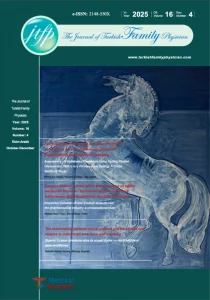Relationship with Sleep Quality and Medical Treatment in Early Smoking Cessation Process
Objective: Nicotine metabolism has important effects on sleep. People who quit smoking due to nicotine withdrawal during the smoking cessation process may experience different sleep disorders. Side effects of pharmacological agents used to quit smoking (Varenicline, Bupropion and Nicotine Replacement Therapy [NRT]) on sleep quality are also known. The aim of this study is to investigate the relationship between smoking cessation and the preferred treatment approach with sleep disorders.
Material and Methods: 520 participants who applied to OMU Family Medicine Smoking Cessation Clinic in 2019 were accepted as the study population. Demographic data of all participants in the survey, smoking characteristics (Fagerstrom Nicotine Dependency Test score [FNDT], pack / year, etc.), sleep characteristics (sleep duration, evening awakenings, etc.) and Pittsburg Sleep Quality Index (PSQI) at their first visit and one recorded months later. Standard treatment of our clinic was applied to all participants. 387 volunteers (71.6%) without any data loss were accepted as the study group.
Results: 165 of 387 (71.6%) people quit smoking in the first month (42.6%). Varenicline was used in 102 (61.8%), Bupropion in 25 (15.1%) and NRT alone in 38 (23.0%) of these patients. Mean sleep time (hours) did not change in this group before and after quitting (6.4 ± 4.8 hours versus 6.3 ± 5.0 hours p> 0.05). There was no difference between the mean PSQI scores of the patient groups receiving different treatments one month later (p> 0.05). Complaints of insomnia (n=5, 17.5%) and drowsiness (n=4, 14.6%) were more common in patients who received Varenicline (x2=12,145, p <0,001).
Conclusion: No difference was detected in the sleep quality of patients who were used different treatment options to quit smoking in the first month.
References
- Carley DW, Farabi SS. Physiology of sleep. Diabetes Spectr 2016;29(1):5-9.
- Saper CB, Cano G, Scammell TE. Homeostatic, circadian, and emotional regulation of sleep. J Comp Neurol 2005;493:92–8.
- Fuller PM, Gooley JJ, Saper CB. Neurobiology of sleep-wake cycle: sleep architecture, circadian regulation and regulatory feedback. J Biol Rhytms 2006;21(6):482-93.
- Fernandez Mendoza J, Vgontzas AN. Insomnia and its impact on physical and mental health. Curr psychiatriy Rep 2013; 15(12):418.
- Ferrara M, De Gennaro L. How much sleep do we need? Sleep Medicine Reviews 2001;5(2):155–79.
- Suzuki K, Miyamoto M, Hirata K. Sleep disorders in elderly: Diagnosis and management. J Gen Fam Med 2017: 30;18(2):61-71.
- Chesson AL et al. The indications for polysomnography and related procedures. Sleep 1997;20(6):423–87.
- Buysse DJ, Reynolds CF, Monk TH, Kupfer DJ. The Pittsburgh Sleep Quality Index: a new instrument for psychiatric practice and research. Psychiatry Research 1989;28(2):193–213.
- Yılmaz D, Tanrıkulu F, Dikmen Y. Research on sleep quality and factors affecting the sleep quality of nursing students. Curr Health Sci J 2017; 43(1):20-4.
- Pomerleau OF. Nicotine and central nervous system: biobehavioral effects of cigarette smoking. Am J Med 1992: 15(93):2-7.
- Trenchea M, Deleanu O, Suta M, Arghir OC. Smoking, snoring and obstructive sleep apnea. Pneumologia 2013;62(1):52-5.
- Phillips BA, Danner FJ. Cigarette smoking and sleep disturbance. Archives of Internal Medicine 1995;155(7):734–7.
- Assayag Y, Bernstein A, Zvolensky MJ, Steeves D, Stewart SS. Nature and role of change in anxiety sensitivity during NRT- aided cognitive-behavioral smoking cessation treatment. Cognitive Behaviour Therapy 2012;41(1):51–62.
- Amiri S, Behnezhad S. Smoking and risk of sleep-related issues: a systematic review and meta-analysis of prospective studies. Can J Public Health 2020; 111(5): 775–86.
- Colrain IM, Trinder J, Swan GE. The impact of smoking cessation on objective and subjective markers of sleep: review, synthesis, and recommendations. Nicotine & Tobacco Research 2004;6(6):913–25.
- Yalcin BM, Ünal M, Pirdal H, Karahan TF. Effects of an anger management and stress control program on smoking cessation: A randomized controlled trial. J Am Board Fam Pract 2007; 20(1):36-44.
- Ağargün MY, Anlar Ö. Pittsburgh Uyku Kalitesi İndeksi’nin geçerliliği ve güvenirliliği. Türk Psikiyatri Dergisi 1996; 7(2): 107-15.
- Heatherton TF, Kozlowski LT, FreckerRC, Fagerstrom KO. The Fagerström test for nicotine dependence: a revision of the Fagerstrom Tolerance Questionnaire. British Journal of Addiction 1991;86(9):1119–27.
- Argüder et al. Sigara bırakma başarısını etkileyen faktörler. Turk Toraks Dergisi 2013;14;81-7.
- Yaşar Z, Kurt ÖK, Talay F, Kargı A. Bir yıllık sigara bırakma poliklinik sonuçlarımız. Eurasian J Pulmonol 2014;16;99-104.
- Karatay G, Gürarslan Baş N, Aldemir H, Akay M, Bayır M, Onaylı H. Hemşirelik bölümü öğrencilerinin uyku alışkanları ve etkileyen etmenlerin incelenmesi. HSP 2016;3:16–22.
- Rujnan T, Çaykara B, Pençe HH. Sigara bağımlılarında dep- resyon, anksiyete, uykululuk ve uyku kalitesi düzeyleri arasındaki ilişkinin belirlenmesi. ACU Sağlık Bil Derg 2019: (10)4:609-15.
- Ashare RL. Sleep disturbance during smoking cessation: withdrawal side effect of treatment? J Smok Cessat 2017;12(2):63-70.
- Boutou AK, Tsiata EA, Pataka A, Kontou PK, Pitsiou GG, Argyropoulou P. Smoking cessation in clinical practice: predictors of six-month continuous abstinence in a sample of Greek smokers. Primary Care Respiratory Journal 2008;17(1):32–8.
- Peters EN, Fucito LM, Novosad C, Toll BA, O’Malley SS. Effect of night smoking, sleep disturbance,and their co-occurrence on smoking outcomes. Psychology of Addictive Behaviors 2011; 25(2):312–9.
- Short et al. Insomnia symptoms as arisk factor for cessation failure following smoking treatment. Addict Res Theory 2017;25(1):17-23.



